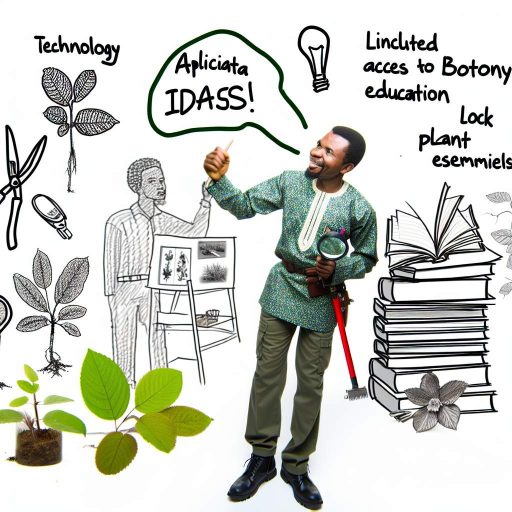Introduction:
Applied biology involves the application of biological principles to solve real-world problems.
It utilizes scientific knowledge to address issues in various industries.
Applied biology plays a crucial role in industries such as agriculture, pharmaceuticals, biotechnology, and environmental conservation.
It helps improve crop yields, develop new medicines, and protect ecosystems.
What is applied biology?
Applied biology is the application of biological knowledge and principles to solve real-world problems.
Definition of applied biology
Applied biology focuses on using biological concepts to develop practical solutions for various issues.
Examples of fields where applied biology is used
- Agriculture: Applied biology is essential for improving crop production and developing sustainable farming practices.
- Biotechnology: Applied biology plays a crucial role in developing new medicines, vaccines, and genetically modified organisms.
- Environmental science: Applied biology helps in understanding and mitigating the impact of human activities on the environment.
- Healthcare: Applied biology is used in medical research, disease diagnosis, and treatment development.
- Food science: Applied biology is important for ensuring food safety, quality, and nutrition.
- Conservation biology: Applied biology is necessary for protecting endangered species and preserving biodiversity.
Career Opportunities in Applied Biology
When considering a career in applied biology, individuals have a wide range of job opportunities to explore.
Below is an overview of the job roles available in the field of applied biology and potential career paths for individuals with a degree in this area.
Overview of Job Roles in Applied Biology
- Laboratory Technician
- Research Scientist
- Environmental Consultant
- Biotechnologist
- Pharmaceutical Sales Representative
- Quality Control Analyst
- Food Scientist
- Healthcare Administrator
These are just a few examples of the diverse job roles available in applied biology.
Each role requires a unique skill set and offers different opportunities for growth and advancement.
Potential Career Paths for Individuals with a Degree in Applied Biology
Individuals with a degree in applied biology have the option to pursue various career paths based on their interests and areas of specialization.
Some potential career paths include:
- Biomedical Researcher: Conducting research to develop new treatments and cures for diseases.
- Environmental Scientist: Studying the impact of human activities on the environment and finding ways to mitigate harm.
- Pharmaceutical Scientist: Developing and testing new medications to improve human health.
- Agricultural Scientist: Improving crop yield and quality through research and innovation.
- Forensic Scientist: Using biology to solve crimes and identify suspects.
- Public Health Officer: Working to prevent the spread of infectious diseases and promote healthy living.
- Conservation Biologist: Protecting endangered species and preserving biodiversity through research and advocacy.
- Genetic Counselor: Providing guidance and support to individuals and families with genetic disorders.
These are just a few examples of the exciting career paths that individuals with a degree in applied biology can pursue.
The field offers a wide range of opportunities to make a meaningful impact on society and the environment.
Delve into the Subject: Anthropology and Nigerian Indigenous Knowledge Systems
Start by obtaining a bachelor’s degree in Biology or a related field.
Consider pursuing a master’s degree or PhD for specialized knowledge.
Gain practical experience through internships or research opportunities.
Develop strong analytical and problem-solving skills.
Stay updated on the latest advancements in the field.
Consider obtaining certifications for specific areas of applied biology.
Network with professionals in the field to build connections and opportunities.
Recommended educational background and qualifications
A strong foundation in biology, chemistry, and mathematics is essential.
Consider taking courses in genetics, molecular biology, and ecology.
Practical experience in a laboratory setting is highly beneficial.
Strong communication skills to effectively communicate research findings.
Critical thinking skills to analyze complex biological problems.
Ability to work well in a team and collaborate with other professionals.
Keep abreast of advancements in technology and tools used in applied biology.
Find Out More: Bioinformatics: Nigerian Contributions to Global Research
Current Trends in Applied Biology
As the field of applied biology continues to evolve, there are several current trends that are shaping the future of this discipline.
From emerging technologies to the impact of applied biology on society and the environment, here are some key trends to watch in the field:
Emerging Technologies and Research Areas in Applied Biology
- Genome Editing: Techniques like CRISPR have revolutionized the way we can edit and modify genes, allowing for targeted gene editing in a wide range of organisms.
- Biotechnology: Advances in biotechnology have led to the development of genetically modified organisms (GMOs) that can resist pests, diseases, and environmental stress.
- Synthetic Biology: Researchers are now able to design and engineer biological systems for specific purposes, paving the way for new applications in medicine, agriculture, and environmental conservation.
- Microbiome Research: The study of the microbiome has gained traction in recent years, revealing the crucial roles that microorganisms play in human health, agriculture, and ecosystems.
- Regenerative Medicine: Stem cell research and tissue engineering are key areas of focus in applied biology, with the potential to revolutionize healthcare and regenerative therapies.
Impact of Applied Biology on Society and the Environment
- Food Security: Advances in applied biology have led to increased crop yields, reduced food waste, and improved nutrition, helping to address global food insecurity.
- Environmental Conservation: By developing biodegradable materials, sustainable agriculture practices, and biofuels, applied biology is playing a critical role in preserving the environment and combating climate change.
- Healthcare: From personalized medicine to the development of new drugs and therapies, applied biology is revolutionizing healthcare and improving patient outcomes.
- Biosecurity: Applied biology is also essential in addressing emerging infectious diseases, bioterrorism threats, and other biosecurity challenges that threaten public health and national security.
- Ethical Considerations: As applied biology continues to advance, it is important to consider the ethical implications of new technologies and research areas, ensuring that they are used responsibly and ethically.
Current trends in applied biology are driving innovation, sustainability, and progress in various fields.
The potential exists to address some of the most pressing challenges facing society and the environment today.
Delve into the Subject: How to Prepare for a Zoology Degree in Nigeria

Role of Applied Biology in Addressing Environmental Challenges
One of the primary roles of applied biology is in developing methods to control and reduce various forms of pollution, such as air, water, and soil pollution.
Applied biology helps in finding innovative solutions for treating and managing different types of waste, including solid waste, wastewater, and hazardous waste.
Applied biology plays a significant role in conserving and preserving biodiversity by studying ecosystems, species, and genetic diversity to understand their importance in the environment.
Applied biology contributes to mitigating climate change by developing strategies to reduce greenhouse gas emissions, enhance carbon sequestration, and adapt to the impacts of climate change.
Examples of How Applied Biology Is Used to Promote Sustainability
Applied biology is employed in adopting sustainable farming practices that optimize crop production while minimizing the negative impact on the environment, such as organic farming and integrated pest management.
Transform Your Career with Expert Guidance
Get personalized mentorship consulting that’s tailored to your unique path. Our expert advice is actionable and exclusive.
Get StartedApplied biology plays a key role in developing bioenergy sources, such as biofuels and biogas, as sustainable alternatives to fossil fuels, thereby reducing greenhouse gas emissions and dependence on non-renewable resources.
Applied biology is utilized in restoring degraded ecosystems through techniques like reforestation, wetland restoration, and habitat creation, which help in improving biodiversity and ecosystem services.
Applied biology is instrumental in bioremediation processes that use living organisms to clean up pollutants in the environment, such as oil spills, heavy metals, and contaminated water, promoting sustainability and environmental health.
Applied biology plays a vital role in addressing environmental challenges and promoting sustainability through its diverse applications in pollution control, waste management, biodiversity conservation, climate change mitigation, sustainable agriculture, bioenergy production, ecological restoration, and bioremediation.
See Related Content: Sustainable Practices in Nigerian Agricultural Economics
When it comes to applied biology, there are several common misconceptions that are important to address.
Let’s debunk some of these myths and clarify the true scope and potential of this fascinating field.
Myth 1: Applied biology is only about studying plants and animals.
Applied biology encompasses a wide range of disciplines beyond just plants and animals.
It includes areas like microbiology, biotechnology, genetics, and environmental science.
Myth 2: Applied biologists only work in laboratories.
While some applied biologists do work in laboratories, many also work in the field conducting research.
They engage in conservation efforts and practical applications of biological knowledge in real-world settings.
Myth 3: Applied biology has limited career opportunities.
On the contrary, applied biology offers a wide variety of career paths in various industries.
Industries include healthcare, agriculture, pharmaceuticals, environmental conservation, and biotechnology.
Myth 4: Applied biology is not as important as other scientific fields.
Applied biology plays a crucial role in addressing global challenges.
These challenges include food security, disease prevention, environmental sustainability, and climate change.
Myth 5: Applied biology is only for scientists with advanced degrees.
While advanced degrees can open up more opportunities, there are many entry-level positions.
These positions require bachelor’s degrees or specialized certifications.
Myth 6: Applied biology is too focused on theoretical knowledge and not practical applications.
Applied biology emphasizes the practical application of scientific knowledge.
It aims to solve real-world problems through hands-on research, experimentation, and implementation of solutions.
Myth 7: Applied biology is not innovative or cutting-edge.
Applied biology is constantly evolving with new technologies, techniques, and discoveries.
It drives innovation in areas like biotechnology, genetic engineering, and precision medicine.
Myth 8: Applied biologists only work in academic settings.
While many applied biologists work in academia, there are opportunities in various sectors.
These sectors include government agencies, non-profit organizations, biotech companies, agricultural firms, and healthcare institutions.
Myth 9: Applied biology is not relevant to everyday life.
Applied biology influences many aspects of our daily lives.
This includes the food we eat, the medicines we take, and the products we use.
Myth 10: Applied biology is not a lucrative career choice.
Due to the high demand for skilled professionals in applied biology, there are many well-paying opportunities available.
This field offers competitive salaries and ample opportunities for growth.
By debunking these common myths and misconceptions about applied biology, we can gain a better understanding.
This understanding reveals the true scope and potential of this dynamic field.
Applied biology plays a vital role in addressing global challenges and improving the quality of life for people around the world.
Applications of Applied Biology
In this blog post, we have addressed some frequently asked questions about applied biology.
We have explored the diverse applications of biology in various fields such as medicine, agriculture, and environmental science.
It is evident that applied biology plays a crucial role in solving real-world problems and improving our quality of life.
By studying and researching in this field, individuals can make a significant impact on society.
We encourage our readers to consider the opportunities within applied biology and to pursue a career in this dynamic and rewarding field.
Whether you are interested in biotechnology, genetics, or ecology, there are countless pathways to explore and contribute to the advancement of science and technology.
Additional Resources
Frequently Asked Admissions Questions (FAQ) | Roy J. Carver …




